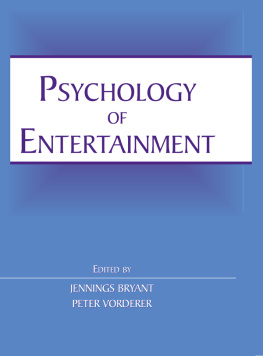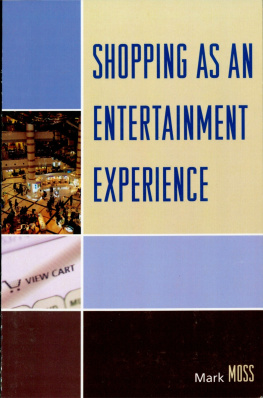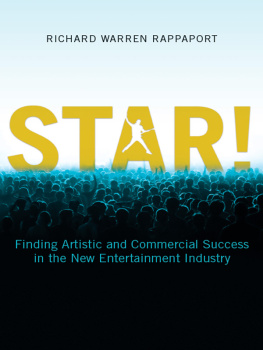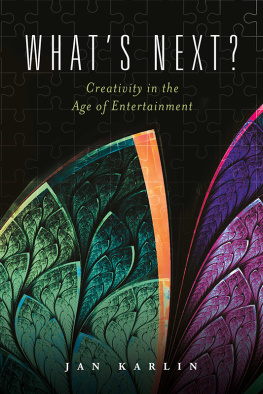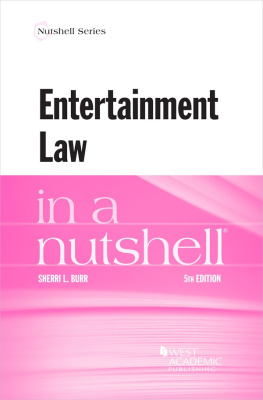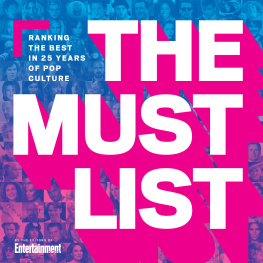PSYCHOLOGY OF ENTERTAINMENT
PSYCHOLOGY OF ENTERTAINMENT
Edited by
Jennings Bryant
College of Communication & Information Sciences
The University of Alabama
Peter Vorderer
Annenberg School for Communication
University of Southern California

Copyright 2006 by Lawrence Erlbaum Associates, Inc.
All rights reserved. No part of this book may be reproduced in any form, by photostat, microform, retrieval system, or any other means, without prior written permission of the publisher.
First published by
Lawrence Erlbaum Associates, Inc.
10 Industrial Avenue
Mahwah, New Jersey 07430
This edition published 2011 by Routledge
Routledge
Taylor & Francis Group
711 Third Avenue
New York, NY 10017
Routledge
Taylor & Francis Group
2 Park Square, Milton Park
Abingdon, Oxon OX14 4RN
Library of Congress Cataloging-in-Publication Data
Psychology of entertainment / edited by Jennings Bryant, Peter Vorderer.
p. cm.
Includes bibliographical references and index.
ISBN 0-8058-5237-9 (casebound : alk. paper)ISBN 0-8058-5238-7 (pbk. : alk. paper)
1. Performing artsPsychological aspects. I. Bryant, Jennings. II. Vorderer, Peter.
PN1590.P76P79 2006
791.019dc22
2005032343
To Plato, Aristotle, Locke, Hobbes, Hazlitt, Hume, Schiller, Freud, Darwin, and the other intellectual giants on whose shoulders all of us have been blessed to stand while studying entertainment.
The Seattle grunge band Nirvana (1991) contributed what may be the defining mantra of these postmodern times in Smells Like Teen Spirit, when they proclaimed, Here we are now, entertain us! As entertainment becomes a trillion dollar a year industry worldwide (EmanuEl, 1995), as our modern era increasingly lives up to its label of the entertainment age (Zillmann & Vorderer, 2000, p. vii), and as economists begin to recognize that entertainment has become the driving force of the new world economy (Wolf, 1999), we can safely say with only a touch of irony that scholars are beginning to catch up with Nirvana and take entertainment seriously. The scholarly spin on entertainment has been manifested in traditional ways (e.g., courses, symposia, sessions at scholarly conferences, consulting) as well as in innovative ones (e.g., videogame design, launching new entertainment companies). Without a doubt, the accumulating empirical evidence, theoretical formulations, and practical wisdom are contributing mightily to the emerging area of entertainment theory.
But the battle is far from won. It is often noted that only by teaching a subject does one fully understand it. A corollary is that teaching makes you cognizant of a topics limitations and weaknesses. Having taught numerous seminars in entertainment theory over the years, and having presented a plethora of lectures on various facets of entertainment on several continents, the volume co-editors were not at all surprised to learn that we concurred on most areas about which we had experienced delimiting knowledge gaps in entertainment theory and research. Moreover, independently we had come to the conclusion that the weakest links included fundamental aspects of the topics intellectual infrastructure. Specifically, both of us had found that conceptualization and explication of key psychological mechanisms underlying entertainment often were inadequate, and the specific ways entertainment processes purportedly differed from those commonly associated with information, education, or persuasion were not always well-articulated.
Once we realized we concurred on areas in which conceptualization and explication of entertainment mechanisms and processes were underdeveloped, we found ourselves taking a positive turn and identifying scholars who were doing excellent research and theory construction in these underserved aspects of entertainment theory. Again, more often than not, we found that we agreed on the identity and scholarly ability of those who were successfully addressing these troublesome abysses.
At some point in our deliberations (i.e., that Eureka moment), we decided that the most productive way of advancing understanding of these psychological mechanisms and processes of entertainment would be to call upon those peers who seemed to be making the most significant progress in understanding these fundamental intellectual underpinnings of entertainment theory and ask them if they would be willing to share their insightsas well as the fruits of their scholarshipwith kindred spirits. To our great pleasure, our associates were more than willing to synthesize their research, as well as the cognate scholarship of others, in the several research domains we had identified. The concrete product of our collaboration is Psychology of Entertainment, which is dedicated to advancing understanding of the fundamental psychological processes and mechanisms of entertainment.
Preparation and Reception Processes
The content of this volume is divided into three basic units. The first section is entitled Preparation and Reception Processes. The six chapters in this portion of the book deal with those fundamental mechanisms and processes involved in orienting to and selecting entertainment fare, as well as receiving and processing it.
In the chapter Motivation, Peter Vorderer, Francis F. Steen, and Elaine Chan ask why human beings from different cultures and historical periods seek out and enjoy the experience of entertainment. They also productively address the question, what is entertainment?, which they consider from both intentionalist and objectivist stances.
Jennings Bryant and John Davies examine a second precursor to entertainment by considering theories and models of the ways modern consumers select entertainment fare from the plethora of choices available to them in todays digital media environment. In Selective Exposure Processes, after considering the intellectual history of selective exposure theory, the authors focus on the processes and outcomes of the theory and critically examine its effectiveness in terms of predicting and explaining selectivity in the information age.
One of the most productive research traditions in media psychology involves the examination of Attention and Television. Daniel R. Anderson and Heather L. Kirkorian describe, integrate, and synthesize the several conceptual, methodological, and empirical dimensions of attention and indicate just how and why attention affords a necessary, but not sufficient, condition for entertainment.
L. J. Shrum tackles the elusive concept of Perception and its manifold roles as a mechanism of entertainment. The literatures from which this explication and extension are derived are extremely diverse, and their successful integration provides novel insights into the ways we perceive entertainment media.
Nothing is more fundamental to entertainment experiences than the ways in which we encode and store media messages. Richard Jackson Harris, Elizabeth Tait Cady, and Tuan Quoc Tran serve as guides through these processes and mechanisms in their chapter on Comprehension and Memory. The chapter concludes with a model of comprehension and memory of entertainment.
The final chapter in this first section is Media Information Processing by Robert H. Wicks. By nature, and by intention, this chapter integrates a great deal of the material from the previous five chapters, plus it offers a number of novel discussions, such as its treatment of schemas and framing.
Reaction Processes
The mechanisms and processes by which we are entertained by the media messages we select and receive are explored in the unit on Reaction Processes. This is the largest section of
Next page
